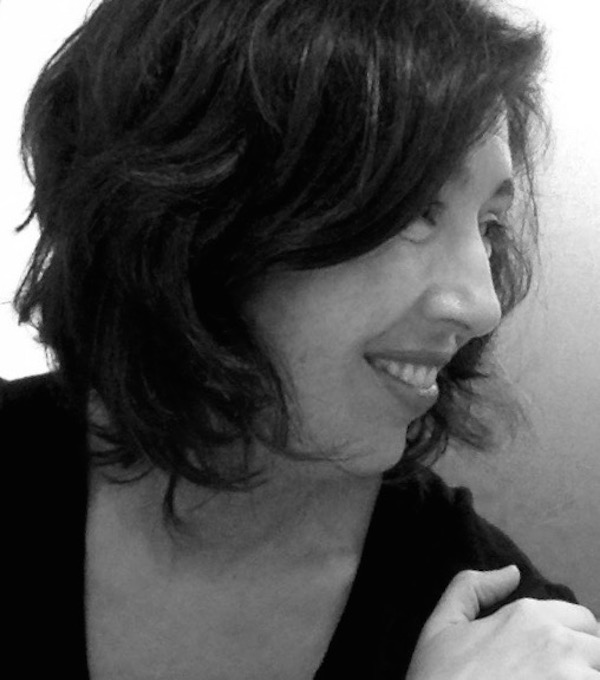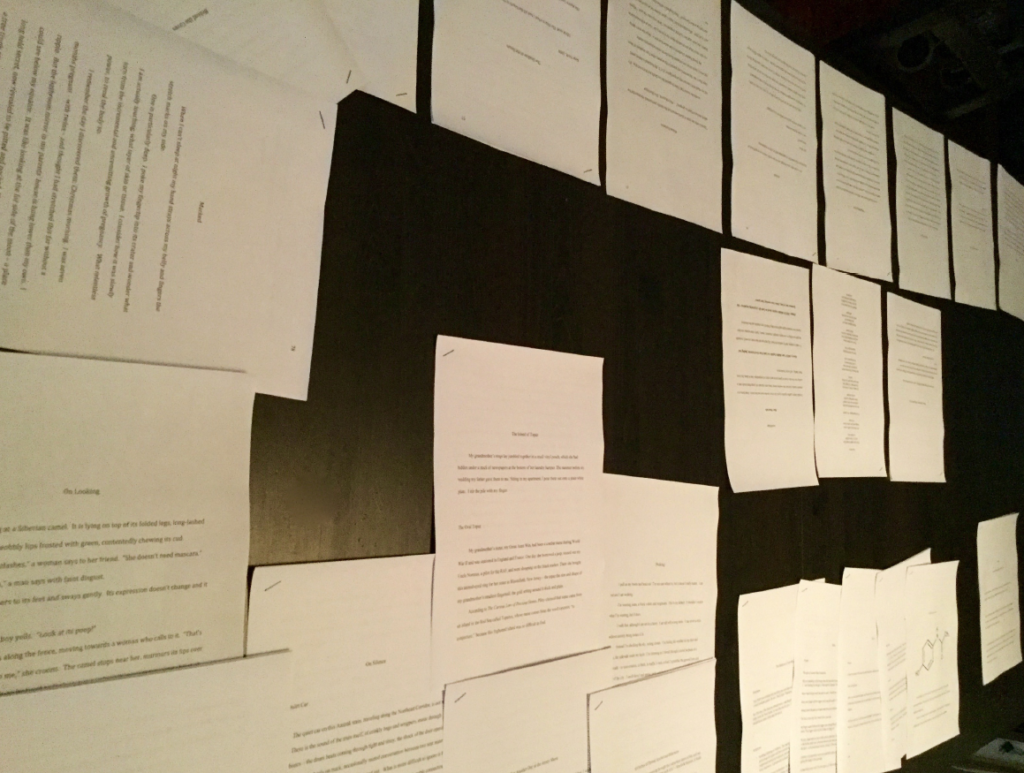
Must an essay collection have a theme?
“Theme” comes from the Latin word thema, which in turn comes from the Greek “proposition.”
A proposition sounds right. An essay proposes. It suggests. It tries and tests. It might argue, but counterarguments are addressed, even encouraged. An essay is not entirely set. It proposes, and the reader answers.
Must an essay collection have a through line?
“Through line” started out nautical—a rope forming part of the ship’s rigging—but now that usage is obsolete. Later it was used to describe a railway line that traveled straight through from one point to another without requiring passengers to change trains. Later still, Stanislavsky used it to describe the “super objective” of a play. So the phrase is no longer for sailing and not often for traveling. Now it is about achieving an overarching objective.
Is this how an essay collection has to be?
“Collection” comes from the Latin verb colligere, from col- “together” + legere “choose or collect.” This I find heartening. An essay collection isn’t—or shouldn’t be—just a random jumble of pieces. The writer chooses the essays, essays that are meant to be together. Maybe they don’t all adhere to a common theme. Perhaps they relate to each other in a less perceptible way. Maybe what they have in common is not a particular subject but the writer’s mind as it plays over stories, thoughts, landscapes, observations, arguments, moods.
Should an essay collection be like a railway line that covers a whole route without requiring passengers to change trains? As a traveler, that sounds convenient—take me straight to the place I’m going; I’ll explore that—not the way. But as a writer—and a reader—I’m not so sure.
When I was putting together my own essay collection, Be with Me Always, I felt the pressure to have a through line, a theme. Essay collections were tough to publish, I knew. At various conferences I was told that the only way I could get a collection published would be if I wrote a novel first. Or if I wrote fun, feminist essays. Or if I published under a man’s name (as if “Randon” isn’t ambiguous enough). My once-upon-a-time agent told me to rewrite my collection as a memoir and we broke up because I wouldn’t. I was determined to write the kind of book I wanted to write— essays, not a memoir. And somewhat un-fun, subtly feminist essays about a range of different things. I would publish under my own name. I would never write a novel.
But a collection without a theme isn’t saleable, the chorus said.
Saleable. I grew to chafe at this word. I thought it was newly invented to discourage weird and challenging and marginal books from being published—particularly essay collections. It turns out that it’s a rather old word, first used in the 1530s, which soon came to mean pretty much what I thought it meant. From the Oxford English Dictionary:
a1661 T. Fuller Worthies (1662) London 219 His book … had been more salable, if more conformed to our modern language.
We all write for different reasons, and we all have different financial needs and expectations. But these are reasons and needs and expectations we need to be conscious of.
During our proverbial New York lunch, right before she signed me, my once-upon-a-time agent asked what I wanted from my writing career—fame? fortune? —as well as what I wanted from this book in particular. I remember saying—so unguardedly, “I want to write a good book that people can read.”
In the years that followed—when this agent and I broke up, when my book was rejected by many more agents, and contests, and presses—I returned to this answer again and again. I return to it now when I wonder why The New York Times hasn’t reviewed it, why that literary festival rejected it, why that award didn’t choose it. I wrote a good book, and people can read it. That’s the main thing.
So if you are putting together an essay collection, I ask you to consider what your motive is in writing this particular book. If you already have a theme that drives your writing, that’s wonderful—follow it where it takes you. But if you don’t have a particular theme—and if you don’t really want to have one—take heart. Write the book you want to write, and then think about how it might be described, pitched, published and sold.
I came to describe Be with Me Always as a collection of familiar essays loosely themed around hauntedness—not through conventional ghost stories but by considering the way certain people or places from our pasts cling to our imaginations. In a way, all good essays are about the things that haunt us, that get under our skin and into our minds and won’t leave until we have at least in some small way embraced or understood them.
But these essays look more specifically at the ways I have been haunted—by a near-death experience, the gaze of a nude model, thoughts of widowhood, Anne Boleyn’s violent death, a book I can’t stop reading, a past lover who shadows my thoughts. The essays are about many different things—tangible things like Tylenol, corporeal things like Stonewall Jackson’s amputated arm, but also abstract things like regret, longing, control and capacity. I wrote what I wanted to write, I followed my curiosities, and this loose theme emerged late in the process.

I remember laying all my essays out on my dining-room table and then circling and circling, rearranging their order, considering which essays talked most intimately with each other and how they might be divided into sections. I wish I had read Dinty W. Moore’s essay “Rivering” then. In it he proposes that each essay follows an invisible magnetic river that reveals its meaning. I now wonder if essay collections can follow the same model.
The river is the writer’s mind. Maybe that mind is preoccupied with one thing for the length of this particular book. Maybe it covers the whole route without asking the passenger to change trains or portage.
But maybe that mind meanders. Maybe it likes a scenic byway. Maybe it forks or branches or eddies and eventually becomes a delta.
The oldest use of the word “through line” referred to the rigging on a ship. Maybe the question is not, Is the book saleable? but Is it sailable? Where can it take you? Down what rivers, over what portages, through what landscapes, into what streams, what harbors, what seas?
What a lovely proposition.
__
Randon Billings Noble is an essayist. Her full-length essay collection Be with Me Always was published by the University of Nebraska Press in March 2019 and her lyric essay chapbook Devotional was published by Red Bird in 2017. Individual essays have appeared in the Modern Love column of The New York Times, The Massachusetts Review, Shenandoah, Brevity, Fourth Genre, Creative Nonfiction and elsewhere. She is currently the founding editor of After the Art.

9 comments
Barry L. Casey says:
May 13, 2019
Lovely, yes! Such a satisfying and affirming essay, closing with a clever play with meaning and etymology.
Phyllis Brotherton says:
May 14, 2019
Affirmation and confirmation. What I needed today! Thank you!
David Licata says:
May 14, 2019
Fantastic. The doubt of worthiness that crept into your consciousness when you “should” have been satisfied with having published a book at all, “should” be relatable to anyone who has submitted anything anywhere. Speaking for myself, you nailed it.
And the penultimate sentence is killer! The delta of the essay, one might say.
marianna crane says:
May 17, 2019
Thank you for writing this–giving permission to the writer to write whatever she wants to write. To write what haunts us especially touched a cord with me. A lovely written essay!
Jan Priddy says:
May 17, 2019
Thank you for this. It is beautiful and smart and it takes me usefully to its destination.
Suzanne Farrell Smith says:
May 17, 2019
Yes! So perfectly stated. I also shared with a friend who is concerned by similar talk of themes and through lines in short story collections.
Kaye Curren says:
May 18, 2019
I was immediately drawn to your title as I had self-published a collection of essays. I had to know I hadn’t written a novel (and never would), had no definite “through line,” and probably would not have a following. But I wrote what mattered to me. I still enjoy having it around to revisit occasionally. It’s my life. What can I say?
Thanks for a relatable and helpful article.
Jenna McGuiggan says:
May 29, 2019
This is such a lovely and heartening piece! Thanks for writing it (and for writing your book).
Sherrey Meyer says:
Jun 5, 2019
Absolutely affirming and confirming, and just what this writer needed to “hear.”